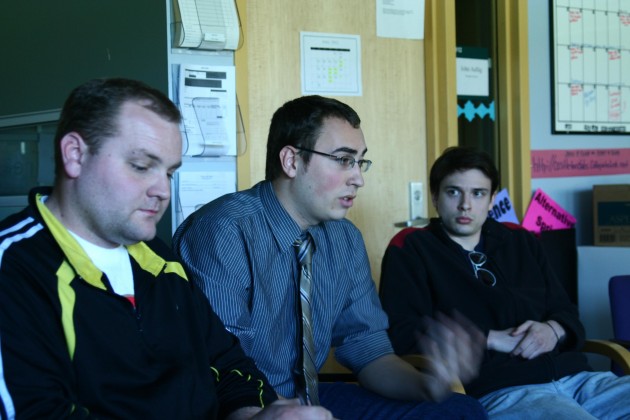Petitioning for SGA re-election

The week before spring break junior Jarrod Sammis, in response to an incident committed during the recent SGA elections, started a petition to campaign for a re-election of five SGA positions: SGA President, SGA Vice President, SGA Vice President of Academics, Senior Class President and Senior Class Secretary.
The petition reads “The calling for this action is due to the document incident of the SGA and Senior Class presidential candidate for 2012 violating SGA election policies of campaigning within fifty feet of voting stations.” The petition states the incident could have promoted “a decisive as well as unfair advantage over other candidates.”
The petition also demands separation of SGA President and Senior Class President and stronger penalties held against students who have violated campaign policies by “barring” those found guilty from “future SGA election processes for one full academic year – including annual or re-election processes.”
Sammis heard about the incident from students then approached John Aellig, Program Advisor to the SGA, expressing interest to start a petition for a re-election. Aellig verified the incident had occurred and responded that College Court had dealt with the issue.
“I’m trying to do something about it,” said Sammis. “It should be up to the students to decide [the court decision] because, ultimately, the power lies with the students, that’s why it’s called Student Government Association.”
College Court found Michael Shalginewicz, who was running for SGA President and Senior Class President guilty of being within 50 feet of the ballot boxes in the Campus Center. College Court gave him a warning.
“I sat down to talk to my friends near the ballot box, behind it,” said Shalginewicz. “I was just sitting there talking to my friends about school, but someone accused me of campaigning.”
SGA President Stephanie Terry wanted to make it absolutely clear that both the SGA and College Court do not deny that mistakes were made in this election. In fact, Shalginewicz was not the only member running for election to be in the wrong.
“Almost every candidate was in one way, shape, or form, violating some form of a policy,” said Terry. “The fairly simple mistakes that were made are just not at the level where it needed a revote. The things that people don’t understand is that Student Government took our policies that we had and we followed them to a T in this particular situation.”
Shalginewicz and his running mates, Corrie Keener and Erica Bilodeau – elected senior class treasurer and senior class vice president respectively – were all shocked to learn about the petition circulating after break despite College Court having resolved the issue.
“I feel it is an attack against me and with two people that I ran with,” said Shalginewicz. “Because in the initial petition it only mentioned our positions.”
A forum was held April 13 in the SGA office for members of the student body to voice their opinions and openly discuss any concerns they have involving the elections.
“We are here now to discuss the opinions of the students,” said Terry opening the discussion. “Student opinions do matter. That’s what the Student Government is for. If we’re not listening to students then we’re not doing our job.”
Sammis examined the SGA handbook to get a better understanding of the policies in violation during the forum. His concerns, along with those of five other students, involved the methods of polling and instances of misconduct in relation to poster placement, polling places and interference of candidates in levying votes. The policy at this time holds that no student may place campaign posters or campaign within 50 feet of the ballot box, no student running for a position may staff the ballot box, and that polling places must be open for a total of ten hours over a minimum of two days.
“These three primary rules have been violated, to the extent of my knowledge … I think that the least controversial way to handle these issues is to hold another election,” says Sammis.
SGA thought the petition, which has over 100 student signatures, was questionable in terms of validity, proper language and meaning.
“I think that it’s kind of vague and that [Sammis] could agree that you didn’t have all of the proper information at the time [the petition] was written,” said Terry.
Some students felt that having only 100 student signatures wasn’t enough to call for re-election.
“It’s only 5 percent of the student body,” said Corrie Keener, delegate of the student congress. “We can’t accept it as being the feeling of the entire student body.”
Though college court and Terry have yet to make a decision whether or not there may be a re-election, Terry saw this beneficial for future students wanting to get involved, as students, with the student government.
“I think the crucial point here is to understand that if there isn’t a revote, Jarrod did make a difference,” said Terry. “He kind of opened the door for students to know that they can go against something that their student government is doing, or has done.”







